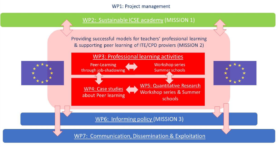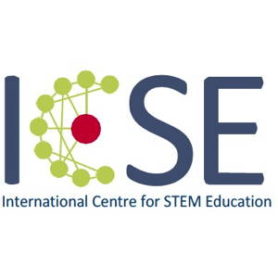ICSE Academy

A project by the ICSE consortium
|
ICSE Academy – Europees Erasmus+ projectEuropese samenwerking en mobiliteit wat betreft nascholing en opleiding van bèta-docenten
European collaboration and mobility in professional development of pre- and in-service STEM teachers 1 juni 2022 tot 1 juni 2025 |
Kern van het project
Het bèta/STEM onderwijs (wiskunde, scheikunde, biologie, natuurkunde, informatica, NLT) in Europa heeft behoefte aan bekwame leraren. De lerarenopleidingen zijn hierin een belangrijke schakel, maar ook de zittende docent hebben behoefte aan bij- en nascholing.
Drie centrale doelen:
|
Vier clusters (van elk drie bijeenkomsten):
|
Planning
| 2022-2 | 2023-1 | 2023-2 | 2024-1 |
| Design of the first pilot ‘webinars’. Four clusters: -Learning by inquiry, Socio-scientific issues and Interdisciplinarity -Diversity and Inclusion in STEM -STEM in a digital era -STEM in Europe |
A couple of pilots
and the STEM Summerschool Utrecht (21-25 August) |
Starting the official ICSE-Academy | Continue |
Meetings: Workshops, Seminars, Summerschool, etc.
[collapsibles]
[collapse title=”Summerschool 2023, Utrecht”]
Read more
[/collapse]
[collapse title=”Kick off 20 september 2022″]
Op deze dag werd ’s middags van 13:00-16:00 een online bijeenkomst georganiseerd met alle betrokken (EU)partners, om elkaar te leren kennen, en eerste afspraken te maken over de vervolgstappen.
[/collapse]
[collapse title=”Summerschool August 2022, Utrecht”]
Mathematics Education (15-25 August 2022)
The Utrecht Summerschool is a joint initiative of Utrecht University, HU and HKU. The Freudenthal Institute took care of a special program for mathematics education.
This summerschool was not part of the ICSE-academy, but there was a first experience with ‘job-shadowing’. This will be continued and expanded in the Summerschool 2023.
[/collapse]
[/collapsibles]
Verdere achtergrond
[collapsibles]
[collapse title=”Abstract (EN)”]
The core of this project Consortium will gather 13 full project partners from 13 European countries, all of them recognized STEM ITE and CPD providers. These 13 full partners constitute the ICSE Academy.
To maximize the potential to develop and test new means for effective, accessible, and transferable professional learning opportunities, the ICSE Academy, furthermore involves (at least) 5 model schools per country which serve as training model schools with a clear commitment to the project (as associated partners).
The main intention behind the committed model schools is that this allows the partnership to work very closely with these schools (and their STEM teachers) and forming strong bonds between ITE/CPD research (higher Education partners), provision (STEM ITE/CPD partners) and practice (schools) in each partner country. These close bonds specifically contribute to work on needs-feasibility-aligned ITE/CPD formats, as it allows to start off from analysing teachers’ needs, involve teachers in the development and testing of professional learning activities and receive their feedback on activities to improve them and ensure their effectiveness, accessibility and transferability. Thus, the role of model schools and their STEM teachers committed to the project are essential for the successful provision of meaningful results.
For effectively implementing change in STEM education, cooperation with policy makers is imperative. The ICSE Academy will therefore also be supported through educational authorities in each country (linked to the project as associated partners), a teacher association and a STEM education network. Their role will be to communicate ITE/CPD needs from policy perspectives top-down (and thus complement the bottom-up needs orientation resulting from needs communicated by the model schools), share knowledge on conditions of national ITE/CPD systems (regulations, obligations, requirements, etc.) and provide their opinion on the policy-relevant results (outlook on European STEM ITE/CPD formats and policy papers).

Project structure (click to enlarge)
[/collapse]
[collapse title=”Regeling (EU)”]
Doel regeling EU: Europese partnerschappen van aanbieders van lerarenopleidingen creëren om Erasmus+ Teacher Academies op poten te zetten die een Europese en internationale kijk zullen bieden op lerarenopleidingen. In deze Teacher Academies zal een belangrijke rol zijn weggelegd voor meertaligheid en culturele diversiteit, worden lerarenopleidingen ontwikkeld overeenkomstig de EU-beleidsprioriteiten op het gebied van onderwijs en wordt een bijdrage geleverd aan de verwezenlijking van de doelstellingen van de Europese onderwijsruimte.
[/collapse]
[collapse title=”Partners in NL (tentatief)”]
- Goois Lyceum
- Lyceum Ypenburg
- Hogeschool van Amsterdam
- ’t Rijks, Bergen op Zoom
- Saba Comprehensive School
- Terra, Winsum
[/collapse]
[collapse title=”Partners”]
| Country | Education Partner |
| Germany | University of Education Freiburg (PHFR) |
| Malta | University of Malta (UM) |
| Cyprus | University of Nicosia (EDEX) |
| Norway | Norwegian University of Technology (NTNU) |
| Lithuania | Vilnius University (VU) |
| Slovakia | University CPU (CPU) |
| Turkey | Hacettepe University (HU) |
| Spain | University of Jaen (UJA) |
| Czech republic | (CUNI) |
| Austria | Klagenfurt University (KLU) |
| Greece | National and Kapodistrian University of Athens (NKUA) |
| Sweden | Jönkoping University (JU) |
| The Netherlands | Utrecht University (UU) |
[/collapse]
[collapse title=”Voorloper uit 2014 (initiatief van Platform Beta Techniek)”]
Eerder werd de naam ‘Teacher Academy’ in Nederland al gebruikt in het kader van een project van het Platform Beta Techniek.
Om (toekomstige) docenten in de bèta- en technische vakken in staat te stellen een betere verbinding te leggen tussen het schoolvak en de beroepspraktijk, is er vanuit het landelijke programma bèta/STEM Teacher Academy (o.a. Platform Bèta Techniek) ingezet op het versterken van de samenwerking tussen onderwijs en het bedrijfsleven. Een van de onderdelen hierin was het opnemen van bedrijfsoriëntatie en -stages in het curriculum van de tweedegraads lerarenopleidingen.
- Het schooljaar 2014-2015 gold als pilot.
- In de jaren 2015-2017 is eea verder uitgebouwd
Het programma bèta/STEM Teacher Academy levert een bijdrage aan de ambitie om (toekomstige) bètatechniekdocenten in het voortgezet onderwijs up-to-date te houden, zodat zij technologische veranderingen kunnen opnemen binnen hun onderwijs en hierdoor hun leerlingen contextrijk les kunnen geven. bèta/STEM Teacher Academy stelt (aankomende) docenten in staat te werken aan hun professionalisering, met de daaruit voortvloeiende positieve gevolgen voor het onderwijs en voor de leerlingen, namelijk:
- De docent raakt geïnspireerd(er) over zijn/haar eigen vakgebied, wat bijdraagt aan inspirerende lessen.
- De docent is op de hoogte van de meest actuele kennis uit het bedrijfsleven en kan daardoor op een goede manier overbrengen aan leerlingen wat de beroeps- en opleidingsmogelijkheden zijn (LOB).
- Het draagt bij aan de aantrekkelijkheid van het beroep van docent.
Het programma bèta/STEM Teacher Academy is een ontwikkelprogramma dat met vijf programmalijnen de samenwerking tussen het onderwijs en bedrijfsleven versterkt. Voor de uitvoering van deze programmalijnen is gekozen voor een regionale aanpak: in de regio komen de lerarenopleiding, de docenten op school en het bedrijfsleven immers samen. Hierbij wordt gebruik gemaakt van bestaande (regionale) netwerken, namelijk:
- Regionale VO-HO netwerken (havo/vwo);
- Toptechniek in Bedrijf-regio’s (vmbo-mbo) / MTech-scholen;
- de tweedegraads lerarenopleidingen;
- NWO-onderzoeksinstituten.
De Teacher Academy bestaat uit vijf lijnen, te weten:
1. BedrijfsDOTs
2. Cursus Bètaberoepen in de Les
3. Leraar in Bedrijf
4. Leraar in Onderzoek
5. Bedrijfsstages Lerarenopleiding
[/collapse]
[/collapsibles]




